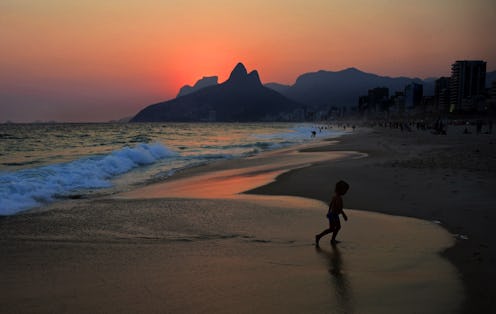News
4 Incredibly Gross Facts About Beaches
Just in case you couldn't get any more grossed out by the beach (everyone pees in that water!), there's a new study to help you out. Research studies of the water and sand from Hawaiian beaches found a "higher abundance" of bacteria from fecal contamination, such as E. coli, in the sand, rather than in the water, according to CBS News. Yep, there's poop on beaches, and unfortunately, that's not the only reason they can be absolutely disgusting.
The new study found that "wastewater-contaminated marine beach sand may act as a chronic source of wastewater bacteria to the beach seawater," which pretty much means that it's the sand that's contaminating the water, and not the other way around. A team led by Tao Yan of the University of Hawaii at Manoa found that bacteria tended to decay at a much slower rate in the beach sand than in the water, because bacteria can become embedded in "biofilms" which shelter it.
Because coming into contact with or swallowing fecal-contaminated water or food can cause stomach ache, diarrhea, and rashes, Yan's team concluded that "beach sand needs to be considered carefully in assessing its impact on water quality monitoring and public health," according to CBS. Thanks, Yan. Unfortunately, Yan's study is just confirming what we've speculated about for a long time. Further, there are many other reasons beaches are gross. Please don't kill the messenger.
1. Lots Of People Pee In The Ocean
In 2014, Procter & Gamble conducted an online study of over 1,000 adults to find out how many people pee in the ocean (or will at least admit to it). The study found that 62 percent of people admit that they have peed in the water at the beach, and of that number, nearly half say they've done it more than once, according to the Cincinnati Business Courier. But on the bright side, it's actually OK to pee in the ocean, apparently. It doesn't attract sharks, and since human pee is 95 percent water, it isn't a pollutant, according to Business Insider.
2. One In 10 U.S. Beaches Don't Meet Water Bacteria Standards
I wish it wasn't so, but in 2014, 10 percent of water samples from U.S. coasts and lakes failed to meet safety standards set by the Environmental Protection Agency, according to CBS. Pollution in the water could be from storm runoff, chemical waste or trash, and human and animal waste.
3. Pretty, White Beaches Are Mostly Made Of Fish Poop
Parrotfish help regulate reefs off the coasts of Hawaii. They scrape and bite dead coral, then additional teeth in the back of their throats break it down into sand. They don't have stomachs, so their meals pass straight through their long intestines and then shoot out of (there's no better saying for this) their butts. A larger parrotfish can produce as much as 840 pounds of sand per year, which is a washed up onto Hawaii's beautiful beaches, according to the Huffington Post.
4. Beaches Can Give You MRSA, A Strain Of The Staph Virus
Not showering, or at least washing your hands, after a day at the beach isn't a great idea. People who forget to do both of those things are 30 percent more likely to get sick from a bacteria called MRSA, which affects the digestive system and the skin. The virus is attracted to salt, which makes it common throughout the water and the sand at beaches.
Images: Getty Images (4); Derek Keats/Flickr
